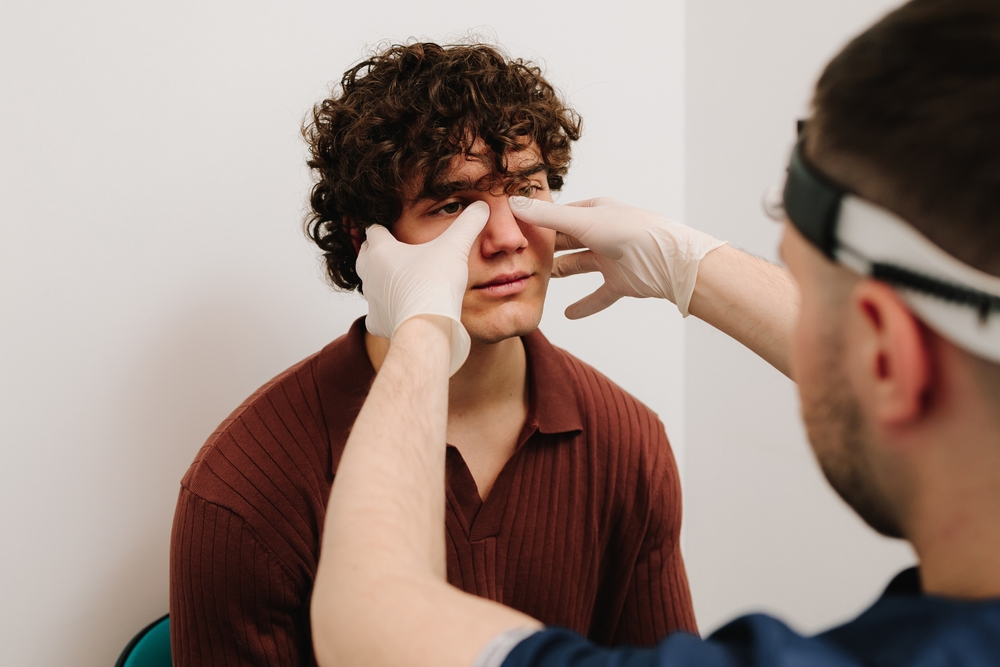Nasal polyps are noncancerous, teardrop-shaped growths that can develop along the lining of your nasal passages or sinuses. While they may remain undetected in their early stages, larger polyps or clusters can create significant problems, from breathing issues to chronic infections. For those who experience these complications, nasal polyp surgery offers a solution to restore health and improve quality of life.
What are nasal polyps and how do they affect you?
Nasal polyps are often small and may not cause noticeable symptoms initially. However, as they grow in size, they can obstruct the nasal airways, leading to uncomfortable and sometimes debilitating effects. Nasal polyps are typically linked to conditions such as chronic sinusitis, asthma, or allergies, which can make them more prone to development.
Nasal polyps symptoms
Common symptoms that may indicate the presence of nasal polyps include:
- Chronic nasal congestion: Difficulty breathing through the nose, particularly on one side.
- Loss of smell or taste: A reduced ability to smell or taste, which can impact daily life.
- Sinus pressure or pain: Feeling of fullness or discomfort in the forehead, cheeks, or around the eyes.
- Frequent sinus infections: A history of ongoing or recurring sinus infections (sinusitis).
- Persistent coughing: Coughing that seems to linger due to postnasal drip.
- Snoring: Especially when the nasal passages are blocked.
- Headaches and facial discomfort: Tension or pain in the face due to sinus pressure.
These symptoms can often overlap with other conditions like the common cold, allergies, or even asthma, which makes it important to see an Ear, Nose, and Throat (ENT) specialist for an accurate diagnosis. If nasal polyps are confirmed, treatment options can then be explored.
Effective treatments for nasal polyps
Treating nasal polyps begins with a non-invasive approach to reduce inflammation and alleviate symptoms. Medications commonly prescribed by ENT specialists include:
- Corticosteroid nasal sprays: To shrink the polyps and reduce swelling.
- Oral steroids: For more severe cases of polyps that don’t respond to nasal sprays.
- Antibiotics: If there is an underlying infection contributing to symptoms.
For many individuals, these treatments effectively shrink the polyps and manage symptoms. However, when medications fail or the polyps cause significant obstruction or pain, surgery may become necessary to remove them.
What are surgical options for nasal polyps?
Surgical removal of nasal polyps is considered when other treatments are ineffective or when polyps are large and deeply embedded. There are a couple of surgical techniques commonly used, depending on the size, location, and severity of the polyps:
- In-Office Polypectomy: If the polyps are small and accessible near the nasal entrance, this procedure can be performed in your doctor’s office. Using a specialized tool like a microdebrider or nasal polypectomy grasper, the ENT specialist can remove the polyps quickly and with minimal recovery time. This procedure typically doesn’t require anesthesia and allows patients to go home the same day.
- Endoscopic Sinus Surgery: For larger or more complex polyps located deeper within the nasal passages or sinuses, endoscopic sinus surgery is often required. This surgery is minimally invasive and performed under general anesthesia at an outpatient surgical center. Using an endoscope—a thin, flexible tube with a camera attached—surgeons can view and remove the polyps without the need for external incisions. This advanced technique ensures faster recovery and fewer complications compared to traditional surgeries.
Recovery and post-surgery care: what to expect
Recovery from nasal polyp surgery varies depending on the procedure and individual health factors. Most patients report feeling better within a few days, although some nasal bleeding may occur post-surgery, which can last up to two weeks. The majority of individuals will fully recover within a week.
Though the success rate of nasal polyp surgery is generally high, polyps may recur, especially in patients with underlying conditions such as chronic sinusitis or asthma. To reduce the likelihood of recurrence, ENT specialists may recommend ongoing use of nasal sprays or other anti-inflammatory medications. Regular follow-up visits are also essential to monitor recovery and ensure that new polyps do not form.
Preventing nasal polyps: long-term care and management
After undergoing surgery, continued care is necessary to ensure lasting results. Preventative measures include:
- Regular follow-up visits: To check for any returning polyps and monitor overall nasal health.
- Daily nasal irrigation: Rinsing the nasal passages with saline solution to clear mucus and reduce inflammation.
- Long-term medication use: Corticosteroid nasal sprays or other prescribed treatments can help keep symptoms in check.
If you’re experiencing symptoms such as persistent nasal congestion, loss of smell, or frequent sinus infections, it’s crucial to see an ENT specialist. They can determine if nasal polyps are the root cause and guide you through the best course of treatment.
Finding an experienced ENT specialist near you is the first step toward regaining your health and comfort.
